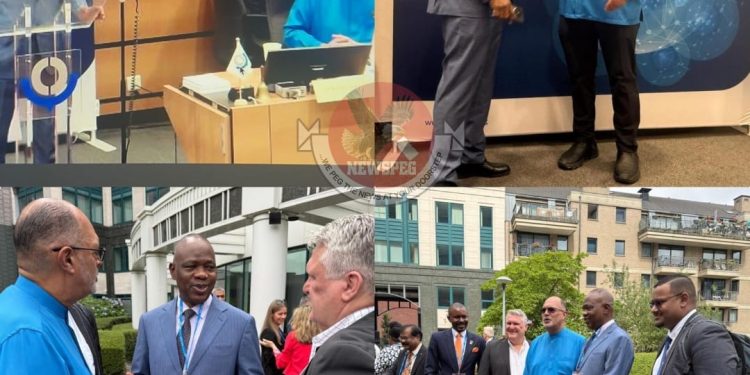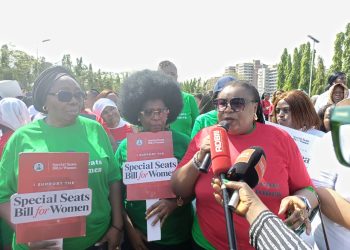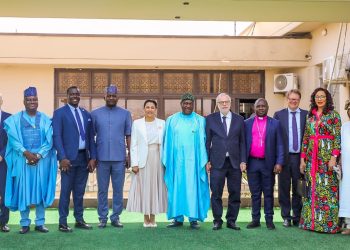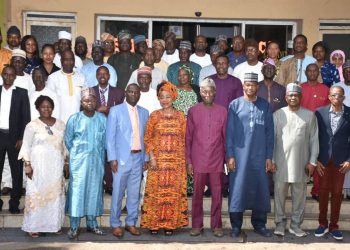By Nkechi Eze
In a major diplomatic and institutional milestone, Nigeria has taken a central role on the global customs stage with the election of the Comptroller-General of Customs, Bashir Adewale Adeniyi MFR, as Chairperson of the World Customs Organisation (WCO) Council. The historic election took place on Saturday, 28th June 2025, during the closing session of the 145th/146th WCO Council meetings held at the WCO Headquarters in Brussels, Belgium.
The development marks a profound moment for Nigeria and the African customs community, as CGC Adeniyi becomes the first Nigerian to ascend to the Council’s highest leadership position since the WCO’s establishment. He succeeds Edward Kieswetter, the Commissioner of the South African Revenue Service, further cementing Africa’s growing influence in shaping global customs dialogue.
CGC Adeniyi’s unanimous election by delegates from 185 member administrations came exactly two years after his appointment as Nigeria’s Comptroller-General of Customs by President Bola Ahmed Tinubu GCFR in June 2023. Since then, Adeniyi has led a sweeping reform agenda within the Nigeria Customs Service (NCS), with visible progress in digitization, enforcement strategy, international partnerships, and trade facilitation — a record that clearly resonated with the global customs community.
Reacting to the announcement, CGC Adeniyi expressed deep gratitude for the trust reposed in his leadership by fellow Council members. “This honour is not mine alone; it reflects the collective progress of the Nigeria Customs Service and the transformative agenda we’ve pursued over the past two years,” he said. “As Chairperson, I pledge to uphold the core values of the WCO, while promoting innovation, equity, and deeper collaboration among member states in response to the complex realities of global trade.”
He reiterated his commitment to providing strategic leadership that aligns with the WCO’s evolving vision. “We are entering a critical phase in the evolution of global trade, where customs must balance facilitation with enforcement, transparency with innovation, and sovereignty with cooperation,” he noted. “I intend to work closely with member administrations and stakeholders to position the WCO as a dynamic, forward-looking institution fit for today’s challenges.”
CGC Adeniyi also paid tribute to his predecessor, Edward Kieswetter, whom he commended for guiding the Council through a period of reform and stability. “His leadership laid a strong foundation that has positioned the Council for its next phase of innovation and global relevance,” he said. “I look forward to building upon that legacy and amplifying the voices of member states, especially those from developing economies, on the global customs agenda.”
The WCO Council is the highest decision-making body of the organisation, with a core mandate to harmonise customs practices, promote modernisation, and foster global cooperation in revenue collection, border security, and trade facilitation. Composed of heads of customs administrations from all WCO member countries, the Council sets policy directions for the organisation and receives reports from its working bodies.
As Chairperson, CGC Adeniyi will lead the WCO’s Policy Commission and steer high-level discussions that address pressing global customs issues, including illicit trade suppression, digitisation of customs processes, effective implementation of trade agreements, and the development of sustainable customs frameworks.
He is also expected to work closely with the WCO Secretary-General, Mr. Ian Saunders, and the broader WCO Secretariat in implementing the organisation’s 2025–2028 Strategic Plan. Particular emphasis will be placed on improving inclusivity, building capacity in developing countries, and enabling a fair, technology-driven global trade system.
In addition to presiding over WCO Council sessions, the Chairperson plays a key diplomatic role, representing the WCO at international engagements and fostering relationships with strategic partners, including the Private Sector Consultative Group (PSCG), development organisations, and international trade institutions such as the World Trade Organization and World Bank.
In a symbolic ceremony following the election, the South African flag was respectfully lowered, and the Nigerian flag raised at the WCO headquarters in Brussels, marking Nigeria’s ascension to the WCO’s highest office. The powerful moment was greeted with applause by delegates and observers, signifying not only a change in leadership but also a nod to Africa’s increasing presence in global governance spaces.
This latest achievement comes on the heels of Nigeria’s recent flurry of international customs engagements, including the signing of a bilateral MoU with Belarus, underlining CGC Adeniyi’s growing reputation as a regional and global leader in customs reform. With Nigeria now at the helm of the WCO Council, expectations are high for greater advocacy on behalf of developing economies, particularly within Africa and the Global South.
Observers note that under CGC Adeniyi’s chairmanship, Nigeria is poised to play a pivotal role in shaping discourse around the African Continental Free Trade Area (AfCFTA), combatting illicit trade, enhancing digital border management, and driving customs innovation that supports global supply chain resilience.
The election of CGC Bashir Adewale Adeniyi is not only a personal honour but a resounding affirmation of Nigeria’s evolving leadership in international customs governance. It is also a reflection of confidence in the Nigeria Customs Service as an institution that is increasingly aligned with global best practices and committed to driving transformational change beyond its borders.
















